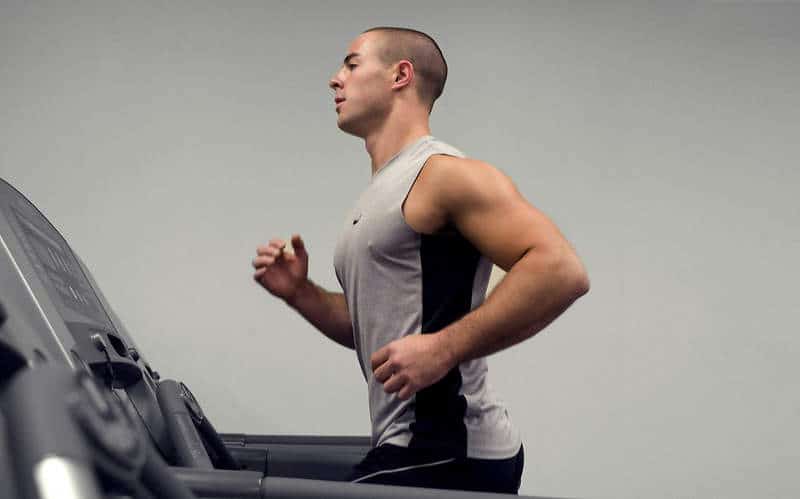 You already know that running has a bunch of health benefits, aids in fat loss, and can even help with muscle building.
You already know that running has a bunch of health benefits, aids in fat loss, and can even help with muscle building.
But you may not know that it can also interfere with your muscle gains and even cause you to lose some of them.
Because of this, many lifters become scared of running or doing any cardio at all, which means you lose out on the benefits. It can be quite confusing and difficult to know exactly what to do.
So, which is correct?
Does running make you lose muscle mass or help you gain it?
The answer is relative.
It can be both a help and a hindrance, depending on a number of factors. We will discuss each of the main factors in this article and give you some tips on how you can enjoy the benefits of running without sacrificing your hard-earned muscle.
How Running Can Make You Lose Muscle
The biggest factor that can cause you to lose muscle when you start to incorporate more running into your training is the energy deficit it creates.
Adding running on top of your weight training demands more energy. Even worse, if you don’t leave time to recover.
Your body converts the food and drink that you consume into energy to fuel your daily activities. It all comes down to an energy balance.
If you eat more calories than you burn each day, you will gain weight. If you eat fewer calories than you burn each day, you will lose weight.
The second part of that equation is where our interest lies. Eating too few calories to support your running is where the problems can occur.

By continuing to run without fueling yourself with enough calories, you force your body to find alternative energy sources.
One place it can find its own energy is by breaking down your body fat reserves. This is why people lose fat and get leaner when they increase their activity levels or decrease their calorie intake.
Unfortunately, another place that your body can find some energy is your muscle tissue. In certain situations, when calorie intake isn’t sufficient, your body will start to break down its own muscle tissue and convert it into usable energy. Not good news.
On top of breaking down your muscle tissue, extra running can affect your recovery abilities as well. If you are running so much that you find it impacts your recovery and general energy levels, your weight training will be impacted.
Of course, being under-recovered in the gym means your workouts are less effective. Less effective workouts could cause you to lose some muscle mass if it continues over the long term.
So, those are the two big ways that a lot of running can hurt your muscle gains; by forcing your body to break down muscle tissue to fuel the running and by negatively affecting your recovery abilities.
Read “Should I Run On An Empty Stomach?” for more on this.
How Running Could Help You Gain Muscle
There has been evidence to suggest that endurance style training can have a positive effect on your insulin sensitivity. [1]
This is good news as insulin has a direct impact on how your body utilizes the nutrients that you feed it.
Insulin is a hormone in your body that is released whenever your body detects an increase blood sugar levels. Blood sugar levels increase pretty much any time you eat but the rise varies depending on what type of food you are eating. For example, carbohydrates are more easily broken down into glucose so they cause a sharper rise in blood sugar levels and a bigger insulin response.
When insulin is released, its job is to shuttle all of the nutrients into your body’s various cells. Some of those cells include your muscles and insulin can help to shuttle much-needed amino acids and glucose into them.
By using cardio to increase the effect of insulin, your muscles will be able to absorb more of the necessary nutrients for recovery and growth.

One more benefit of increased running, or any cardio for that matter, is the conditioning effect it has on your body. It can actually help to increase your work capacity inside the weight room.
By running more, you will be making your cardiovascular system stronger and more efficient. A stronger heart and set of lungs could make a huge difference in some of the higher rep sets.
You could even squeeze out an extra rep or two as a result of being better conditioned. Those extra reps can certainly add up to extra muscle gains over time.
A good way to increase cardio activity is to run on the treadmill. Even better if you have one at home. You can check out some good but affordable treadmills for home use in this article.
How To Run More Without Losing Muscle
We have discussed how running can have both negative and positive impacts on your muscle gaining progress. Now, you need to come up with a plan so that you can get the positives without those negatives.
Here are some tips and tactics that you can use to help you maintain your muscle mass while increasing the amount of running you do.
Fuel Your Training
You learned earlier that not having sufficient energy is a huge cause of muscle loss after adding more running and cardio into a training program.
To combat that fact, you need to ensure the extra energy requirements are being met by your diet. A balanced diet that contains appropriate amounts of all three macro-nutrients is recommended.

Healthy fats and adequate carbohydrate intake are crucial for supplying your body with the energy it needs to take part in both running and weight training. The carbohydrates also play a key role in recovery after a training session.
Protein intake is vital for muscle growth and recovery from your workouts.
Smarter Programming
You really need to listen to your body if you are planning on working heavily with different training styles. Be sure to monitor how you are feeling during your gym sessions and running workouts.
It would be a good idea to start off with a minimal amount of extra training to let your body adapt before increasing the amount you do.
You may even have to pick one area to put more of your focus into. For example, if you choose to really hit your running hard, it could be a wise decision to ease off on your weight training and plan your strength program to maintain your current levels for the time being.
The same approach can be taken in the opposite situation.
It becomes much easier to keep on top of your recovery if you are only pushing one type of training to the max instead of trying to go all out with two very different training goals.
Running And Muscle Loss: Conclusion
Running can make you lose muscle but it can help out as well. It all comes down to planning and being prepared.
Take a smart approach to your training program by thinking of your overall end goal and then plan your training around that. Only include what is vital to your goal and get rid of everything else.
The same level of planning must also go into your nutrition.
At the end of the day, it really comes down to being clever with it. Yes, it is more difficult to train heavily for both running and muscle growth but there is no reason it can’t be done.
Sources
[1] Exercise dose and insulin sensitivity: relevance for diabetes prevention. – https://www.ncbi.nlm.nih.gov/pubmed/22051572
Leave a Reply